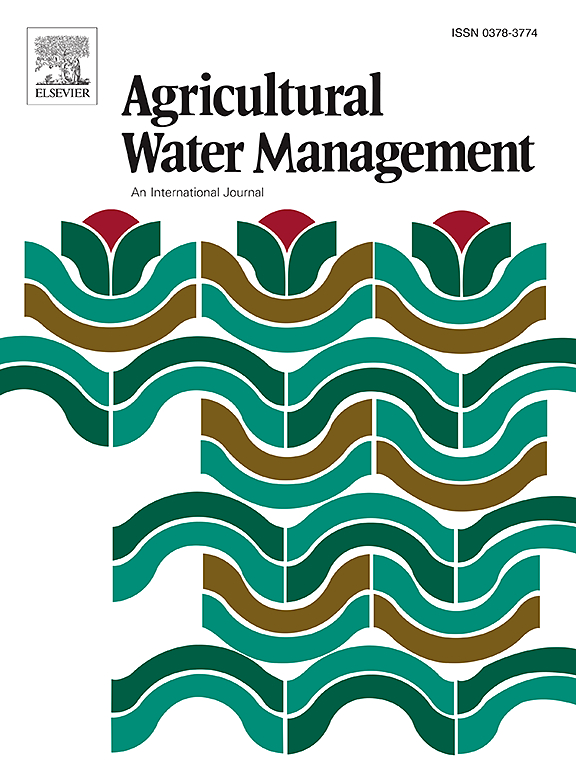Testing the reliability of soil moisture forecast for its use in agriculture
IF 5.9
1区 农林科学
Q1 AGRONOMY
引用次数: 0
Abstract
The increased frequency and intensity of drought events are among the major impacts of climate change in various regions worldwide, including Central Europe. These changes have increased the demand for precise drought monitoring and forecasting tools and their validation. The Czech Drought Monitoring System, which is widely utilized across Central Europe, provides daily soil moisture monitoring and medium-range forecasts using the SoilClim model. The main objective of this study was to describe and evaluate the spatiotemporal reliability of these forecasts. The forecasting performance was evaluated for three variables (relative soil moisture content, soil moisture deficit, and drought intensity) and was evaluated using Pearson’s correlation, mean bias error, and mean absolute error. All the statistical analyses were performed on data from the years 2019 to 2021 aggregated at the administrative district level in the Czech Republic. The growing season data were analyzed in detail to assess the forecasting accuracy during spring and summer. Furthermore, the ability to forecast rapid changes in the soil moisture content according to changes in meteorological variables, such as precipitation and air temperature, was evaluated. Our findings demonstrate that the SoilClim model forecasts are accurate and suitable for practical applications in sectors such as agriculture and forestry. The lowest reported correlation between the monitored and forecasted values was +0.68 for nine-day forecasts at a soil depth of 0–40 cm. For shorter forecast periods of one and four days, the correlation values were +0.80 or greater. For drought intensity, the errors did not exceed one category of drought severity. We identified summer as the most dynamic season, with corresponding variations in the soil moisture and meteorological forecasting accuracy. This study validates the ability of the Czech Drought Monitoring System to provide reliable soil moisture forecasts, thus contributing to our ability to manage and mitigate drought impacts effectively.
测试土壤水分预报在农业中应用的可靠性
干旱事件的频率和强度增加是气候变化对包括中欧在内的世界各地区的主要影响之一。这些变化增加了对精确干旱监测和预报工具及其验证的需求。在中欧广泛使用的捷克干旱监测系统提供每日土壤水分监测,并利用 SoilClim 模型进行中期预报。这项研究的主要目的是描述和评估这些预报的时空可靠性。对三个变量(土壤相对含水量、土壤水分亏缺和干旱强度)的预报性能进行了评估,并使用皮尔逊相关性、平均偏差误差和平均绝对误差进行了评价。所有统计分析都是针对捷克共和国行政区一级的 2019 年至 2021 年汇总数据进行的。对生长季节数据进行了详细分析,以评估春季和夏季的预报准确性。此外,还评估了根据降水和气温等气象变量的变化预测土壤含水量快速变化的能力。我们的研究结果表明,SoilClim 模型预测准确,适合农业和林业等部门的实际应用。据报道,在土壤深度为 0-40 厘米的九天预报中,监测值与预报值之间的最低相关性为 +0.68。对于 1 天和 4 天的较短预报期,相关值为 +0.80 或更高。在干旱强度方面,误差不超过一个干旱严重程度类别。我们发现夏季是最多变的季节,土壤水分和气象预报准确度也相应变化。这项研究验证了捷克干旱监测系统提供可靠的土壤水分预报的能力,从而提高了我们有效管理和减轻干旱影响的能力。
本文章由计算机程序翻译,如有差异,请以英文原文为准。
求助全文
约1分钟内获得全文
求助全文
来源期刊

Agricultural Water Management
农林科学-农艺学
CiteScore
12.10
自引率
14.90%
发文量
648
审稿时长
4.9 months
期刊介绍:
Agricultural Water Management publishes papers of international significance relating to the science, economics, and policy of agricultural water management. In all cases, manuscripts must address implications and provide insight regarding agricultural water management.
 求助内容:
求助内容: 应助结果提醒方式:
应助结果提醒方式:


